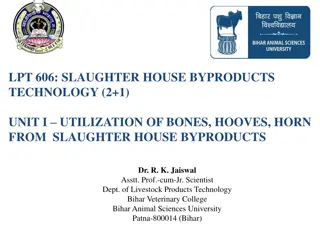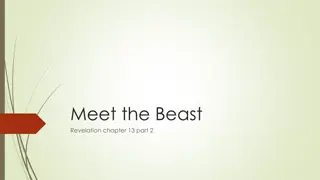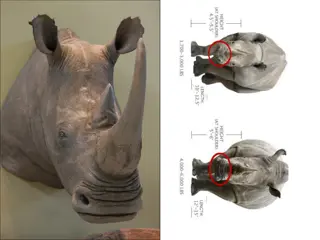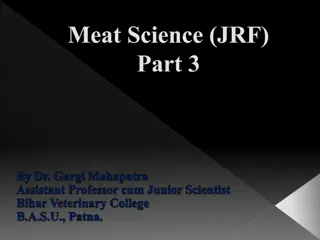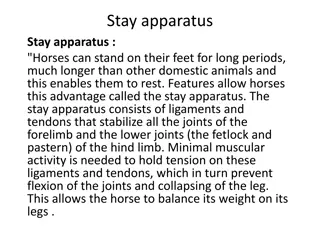Understanding Horn Antennas in Microwave Technology
Horn antennas are integral in microwave technology, offering high gain, low VSWR, and wide bandwidth. Widely used for radio astronomy, satellite communication, and more, horns play a crucial role in various applications. Learn about the design, characteristics, and radiation properties of horn anten
6 views • 21 slides
Utilization of Bones, Hooves, and Horn from Slaughterhouse Byproducts
Bones, hooves, and horns from slaughterhouse byproducts hold significant value and can be utilized for various purposes. Bones contain organic and inorganic matter, with applications in manufacturing, poultry feeds, and pottery. Hooves and horns contribute to gelatine and glue production, derived fr
0 views • 42 slides
Unveiling the Beast in Revelation Chapter 13
The Book of Revelation describes a fearsome beast with seven heads, ten horns, and blasphemous names. It receives power from the dragon, causing worldwide worship and wonder. The beast speaks blasphemies against God and engages in warfare against the saints, with authority over all nations. This eni
0 views • 14 slides
Oceanus: The Titan God of Water and Rivers
Oceanus, the Titan god born of Uranus and Gaea, is the original source of water in Greek mythology. He is the god of the Okeanos, a vast river encircling the world and connecting realms. Married to Tethys, his sister, they had thousands of children, Oceanids and river spirits. Oceanus, depicted in a
0 views • 10 slides
Unveiling the Sounds of the Shofar: A Journey into Rosh Hashanah Traditions
Uncover the rich tradition of sounding the Shofar on Rosh Hashanah, exploring diverse shofar types and the significance of different sounds. Delve into the origins of Rosh Hashanah, the various shofar blasts, and the intricate interpretations of tekiah, shevarim, and teruah calls. Witness the beauty
3 views • 16 slides
Understanding the Common Integuments and Skin Anatomy
The common integuments encompass the skin, hairs, skin glands, claws, hooves, and horns, playing vital roles in protection, thermoregulation, and drug administration. The skin's structure consists of the epidermis and dermis layers, renewing continuously to maintain its functions. Additionally, nail
0 views • 11 slides
Understanding Cattle Management and Classification
Cattle, belonging to the genus Bos, are classified into three types - Bos Taurus, Bos Indicus, and Bos Africans. They are ruminants with fixed hollow horns, udders with four teats, and males have teats on the scrotum. Cattle are utilized for milk production, agriculture, and meat manufacturing. They
0 views • 70 slides
Interesting Facts About Various African Wildlife Species
Learn about the unique characteristics and behaviors of different African wildlife species such as White Rhino, Sable Antelope, Gerenuk, Defassa Waterbuck, Fringe-eared Oryx, and Wilderbeest. From territorial marking to threat displays and distinct physical features like horns, each species has fasc
0 views • 12 slides
All About the Shofar: Symbolism, Types, and Traditions for Rosh Hashanah
Explore the significance of the shofar in Jewish traditions, its various types from different animal horns, and the rituals surrounding its use in Rosh Hashanah and Yom Kippur. Learn about the sounds of the shofar, the timing of when it is sounded, and the historical background of this sacred instru
0 views • 24 slides
Understanding Animal By-products in Meat Science Research
This article delves into the realm of animal by-products in meat science, exploring their categorization and diverse uses in various industries such as food, pharmaceuticals, and cosmetics. From secondary products like Hoof/Feet and horns, thyroid glands, to bones, this comprehensive guide sheds lig
0 views • 22 slides
Practical Histology: Spinal Cord Tracts and Neurons Overview
This practical histology guide covers the cervical, thoracic, and lumbar spinal cord segments, along with ascending and descending tracts, and pseudo-unipolar/unipolar neurons. It emphasizes key features such as the ventral and dorsal horns, gracile and cuneate tracts, and provides essential informa
0 views • 12 slides
The Anatomy of Horses and Domestic Ruminants
Horses possess a unique stay apparatus that allows them to stand for long periods with minimal muscular activity, while domestic ruminants like cows, sheep, and goats have osseous horns that grow continuously. The stay apparatus in horses consists of ligaments and tendons stabilizing their joints, e
0 views • 6 slides

